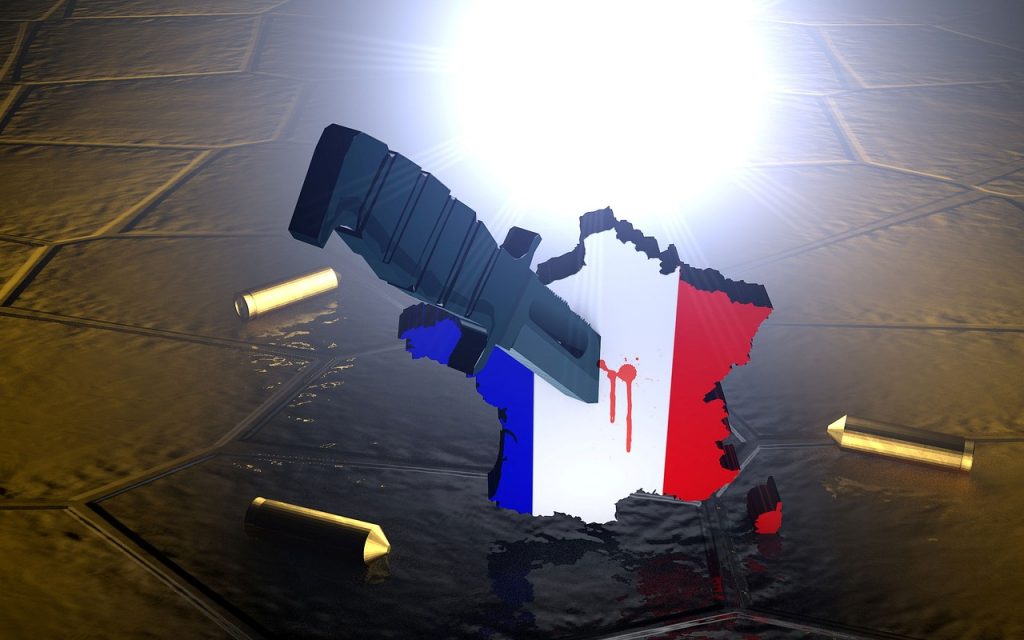President Emmanuel Macron praises an assassinated teacher
In a courtyard at the Sorbonne, the paramount French symbol of learning, President Emmanuel Macron on October 21st paid homage to a teacher slain “for embodying…the freedom that is transmitted and sustained at school.” Samuel Paty was a middle-school history teacher in Conflans-Sainte-Honorine, a genteel town north-west of Paris. Earlier this month he had shown pupils caricatures of the Prophet Muhammad from the satirical newspaper Charlie Hebdo during a class on freedom of expression. Those pupils who might be offended, he suggested, could choose not to look at them. On October 16th, after threats against him by a parent and on social media, Mr Paty was beheaded in an attack that police are treating as an act of terrorism.

Shortly before Mr Paty’s class discussion, on October 2nd, Mr Macron had given a speech not far from Conflans in which he warned the French about the rising threat of “Islamist separatism”. This is a radical political project, he declared, which is testing the resilience of the secular French republic, and menaces “freedom of expression, freedom of conscience and the right to blaspheme”. Mr Macron was accused in some quarters of cynically chasing the far-right vote, in others of stigmatising Muslims. Mr Paty’s beheading has rendered his analysis less extravagant than prescient.
“France’s tolerance for ridiculing religion is often difficult for outsiders to understand” The land of Voltaire protects the right to believe, and not to believe, as well as the right to treat any sacred belief with irreverence. It also attempts to banish religious affairs from official public life. A law in 1905 entrenched laïcité, a strict form of secularism designed to protect private religious expression but also to keep religion out of state institutions, after an anti-clerical struggle with the Catholic church. It is buttressed by another law that protects the right to blaspheme, which dates to 1881.
For secularists this requires constant vigilance. France’s blasphemy law has protected the publication by Charlie Hebdo of satirical caricatures of the Prophet (the ones Mr Paty showed his pupils) against charges of incitement to hatred. Under French law it is legal to denigrate a religion, but not to insult or incite hatred of any individual on the basis of that religion. The overall effect, critics claim, is to legitimise Islamophobia. Defenders of the law note that a religion is an idea, and ideas should be open to debate and mockery. They add that mocking Jesus is equally protected.
Since he was elected in 2017 Mr Macron has found it awkward to talk publicly about all this. Five years ago, when he was economy minister and France was battered by terrorist attacks, including one at the Charlie Hebdo offices, he sounded more laissez-faire about secularism. As president, he seems to have had second thoughts. He is now convinced that the “soft” signs of Islamism—such as a bus driver who refuses to take female passengers dressed “unsuitably”—may mask a more sinister political plan, which can supply recruits to violence.
“Since 2017 anti-terrorist police have thwarted 32 attempted attacks in France”
“The problem,” Mr Macron said in early October, “is an ideology which claims its own laws should be superior to those of the republic.” Hugo Micheron, author of a book on jihadists in France, says it is no coincidence that a teacher was the target. “Education in France represents the transmission of the principles of the republic,” he says, and today’s generation of jihadists are “waging an ideological war to counter that transmission, and in which France is seen as the factory of Western ideology.”
The government has responded with a clampdown. It has outlawed one Islamist association, and the police have raided others. Gérald Darmanin, the interior minister, has ordered the closure of a mosque on the Paris fringes, and wants to expel 231 Islamist radicals and shut down aid groups he deems fronts for radicalism. He also wants better control of hate speech on social media. Before Mr Paty was slain, a parent denounced the teacher on Facebook for “Islamophobia”. Another radical known to the French intelligence services also mobilised against him. This amounted to what Mr Darmanin called a “fatwa” against Mr Paty. The perpetrator himself—an 18-year-old refugee of Chechen origin, who was shot dead by the police—posted a photo of the decapitated head on social media. Addressed to Mr Macron, it boasted of the killing of “one of your hell dogs who dared to denigrate Muhammad”.
As France tightens up, this will doubtless embolden those critics who accuse the government of “weaponising” secularism against Muslims. For his part, Mr Macron says he wants to avoid being trapped by those who seek to portray the combat against political Islam as one that “stigmatises all Muslims”. It is, rather, about the French state’s ability to educate children, believers or non-believers, as free-thinking citizens. The struggle, said Mr Macron, is nothing less than “existential”.
![]()
From The Economist, published under licence. The original article in English can be found on www.economist.com